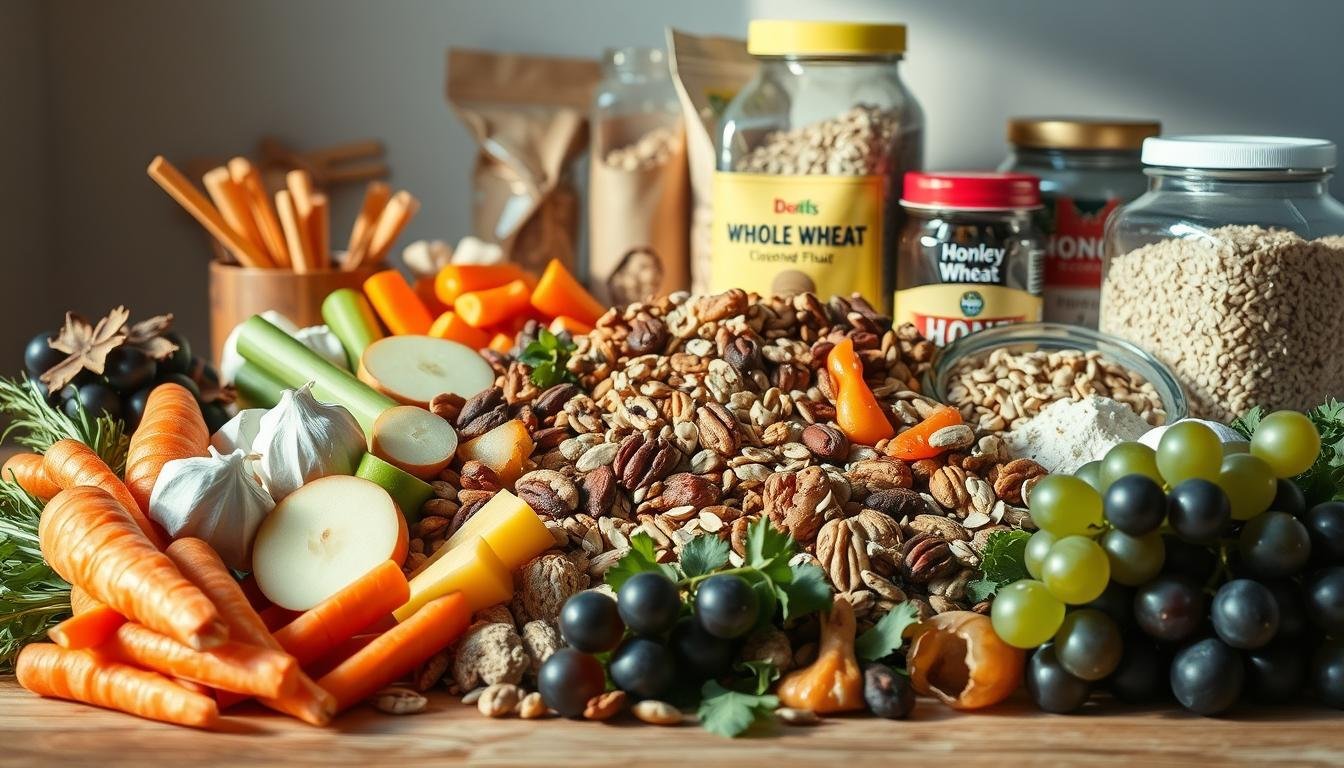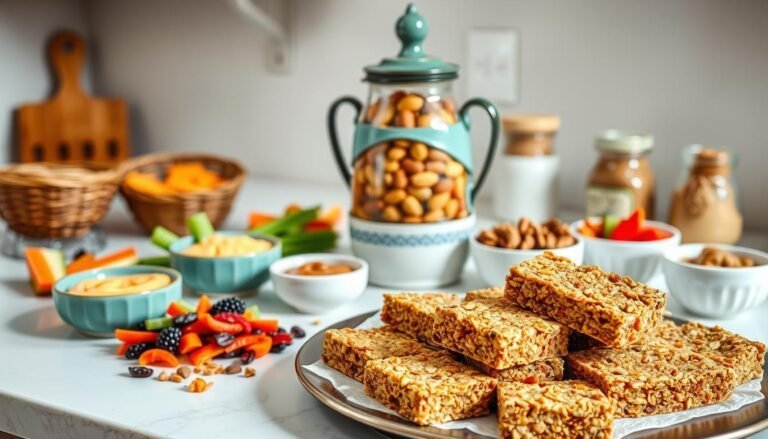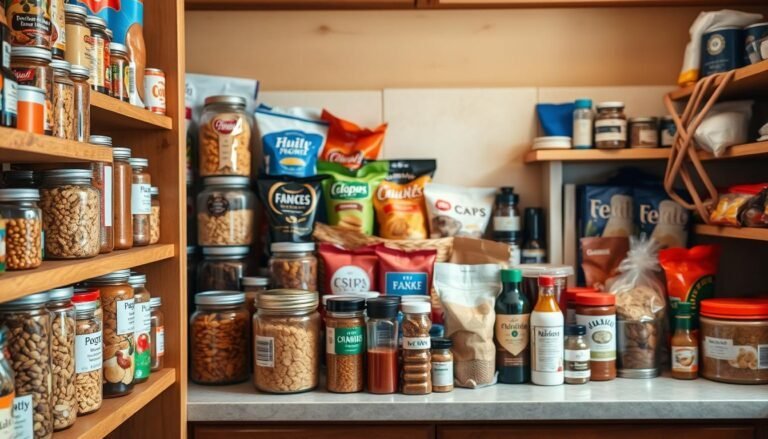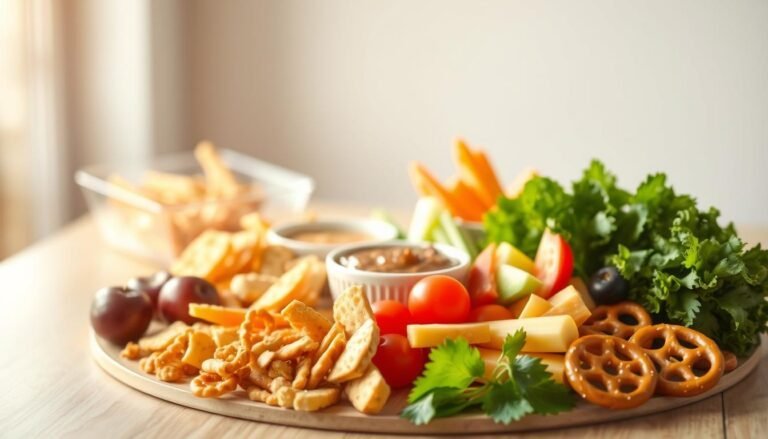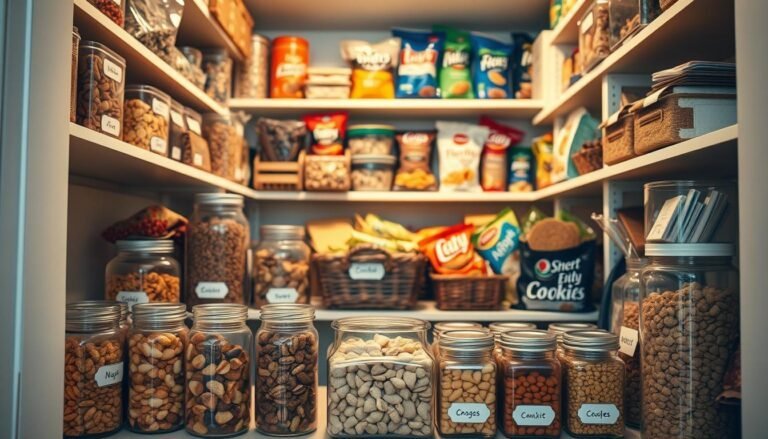Disclosure: This Post Contains Affiliate Links; We earn a commission on purchases.
Having the right ingredients is key for healthy snacks. But, it’s not always easy to have everything you need. Substituting snack ingredients can save the day. It lets you make tasty and healthy snacks without a trip to the store.
With kitchen hacks for snack ingredients, you can swap out missing items. For example, in no-bake peanut butter cookies or energy balls, you can change ingredients to fit your diet or taste.
Key Takeaways
- Substituting snack ingredients can help you create healthy snacks even when you don’t have all the required ingredients.
- Kitchen hacks can help you replace missing ingredients with suitable alternatives.
- No-bake peanut butter cookies and energy balls are great examples of snacks where ingredient substitutions can be applied.
- Substituting ingredients can help you cater to dietary needs and preferences.
- Having the right substitutions can save you from making an extra trip to the store.
The Art of Snack Ingredient Swapping
Swapping ingredients is an art that can change your snack recipes. It’s about being flexible and creative with what you have.
When the Pantry Lets You Down
We’ve all been there – searching the pantry and finding we’re missing something. Don’t let that stop you! Instead, learn to swap ingredients well. For example, if a recipe needs almond butter but you have peanut butter, you can swap it. Here are some common swaps:
- Using peanut butter instead of almond butter
- Swapping oats for granola
- Replacing honey with maple syrup
How Substitutions Can Improve Your Snacks
Substitutions aren’t just for saving a recipe; they can also make your snacks better. By trying different ingredients, you can find new tastes and textures. For example, using coconut oil instead of butter can make your granola bars special. Some benefits of swapping ingredients include:
- Accommodating dietary restrictions or preferences
- Exploring new flavors and textures
- Making snacks more nutritious
By embracing the art of swapping ingredients, you can elevate your snack game.
Baking Essentials: Flour, Sugar, and Leavening Agent Substitutes
Don’t let missing ingredients stop you from baking. Here are some key substitutes for flour, sugar, and leavening agents. Baking is all about creativity and finding new ways to make things work. Whether you’re baking banana bread or muffins, knowing these substitutes can save the day.
All-Purpose Flour Alternatives
All-purpose flour is a must-have, but you can use other flours or ingredients when it’s gone. Try almond flour, coconut flour, or oat flour. Almond flour is great in banana bread, adding moisture and taste. But remember, each flour is different, so your baked goods might change a bit.
Sugar and Sweetener Swaps
Sugar is key in baking, adding texture, flavor, and color. If you’re out, try honey, maple syrup, or coconut sugar. Keep in mind that liquid sweeteners like honey and maple syrup add moisture. You might need to adjust the liquid in your recipe.
Baking Powder and Baking Soda Replacements
Leavening agents like baking powder and baking soda are essential for baked goods to rise and have the right texture. If you’re missing these, you can make your own. For baking powder, mix baking soda with cream of tartar. For baking soda, you can use baking powder, but it might change the taste a bit.
Adjusting Recipes When Using Flour Substitutes
When using flour substitutes, you often need to tweak the recipe. Different flours soak up liquid differently. For example, coconut flour soaks up a lot more than regular flour. You might also need to adjust leavening agents or add xanthan gum for texture. Start with small batches to find the right mix.
- Check the ratio of flour substitutes to liquid ingredients.
- Adjust leavening agents as needed.
- Consider adding xanthan gum for texture.
Dairy and Egg Substitutions for Snack Recipes
Many snack recipes use dairy and eggs. But, you can find creative ways to replace them. This keeps the taste and texture great. If you’re avoiding dairy or eggs, or just out of them, there are many options.
Milk Alternatives That Work in Snacks
Milk is key in many snacks, like oatmeal cookies and creamy dips. If you can’t have milk or prefer not to, there are milk alternatives. Almond milk, soy milk, and coconut milk are good choices. They work well in different snack recipes.
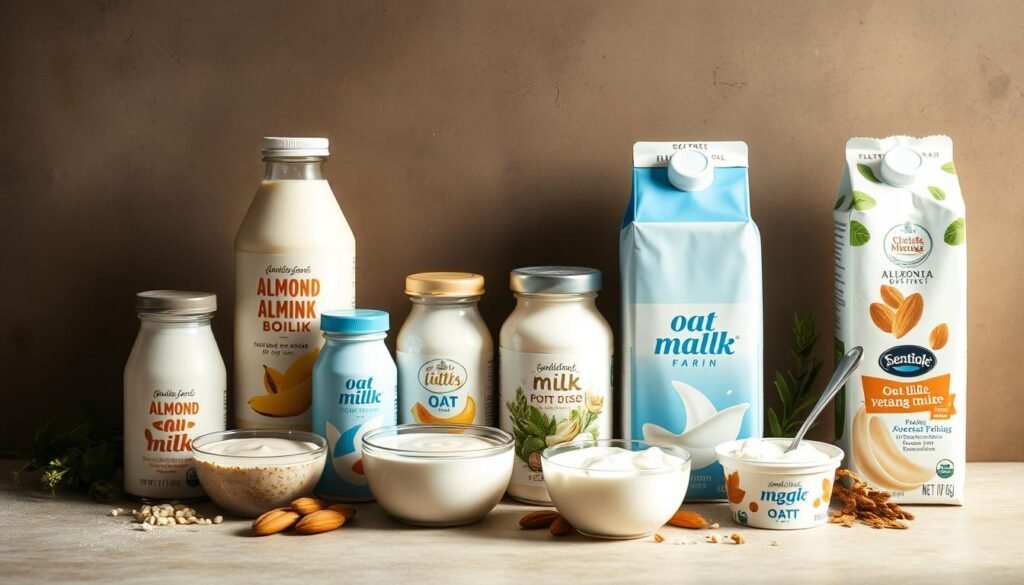
Butter and Oil Replacements
Butter and oil add moisture and flavor to snacks. Instead of butter, try dairy-free margarine or coconut oil. For oil, applesauce or mashed banana can cut down fat and add moisture. For example, applesauce in cookie dough makes them chewier.
Egg Substitutes for Binding and Leavening
Eggs do many things in baking, like binding and leavening. For egg substitutes, use flaxseed meal mixed with water, mashed banana, or egg replacers. These help hold ingredients together and give snacks structure.
Dairy-Free Alternatives for Creamy Textures
Getting a creamy texture without dairy is easy with the right ingredients. Coconut cream, cashew cream, and soy yogurt are great for creamy textures. For instance, cashew cream makes a tasty dairy-free cheesecake.
Easy Substitutions for Snack Ingredients You Don’t Have
It can be tough to get ready for snacks when you’re missing key ingredients. Luckily, many snacks can be made with what you already have or can buy easily. Knowing these swaps can help you make tasty snacks even when you’re missing something.
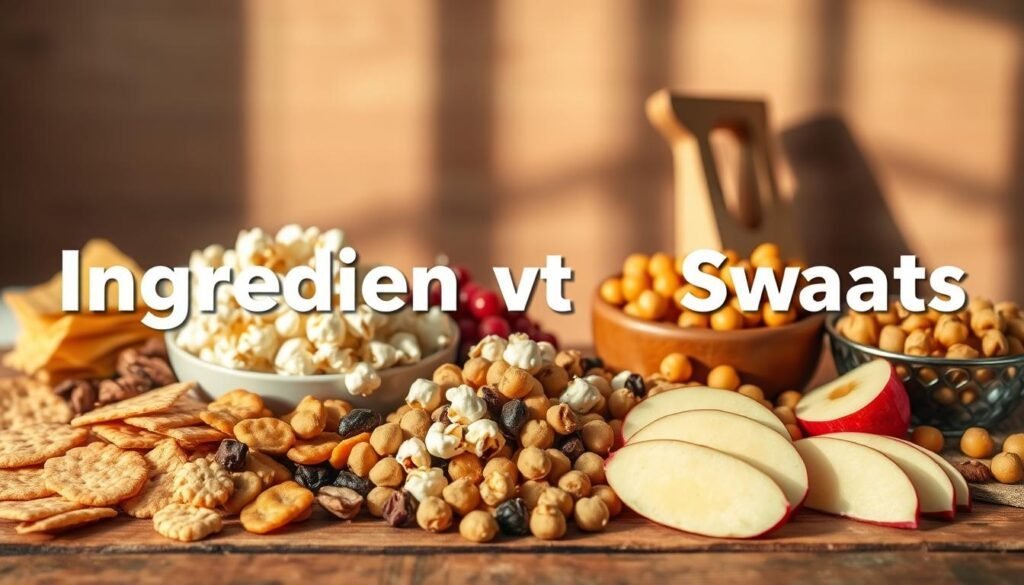
Nut and Seed Alternatives for Allergies and Preferences
For those with nut allergies or who just don’t like nuts, seeds are a great choice. Sunflower seeds can replace almonds or walnuts in many recipes. Chia seeds are also a good substitute, adding omega-3s to your snacks.
Chocolate and Candy Substitutions
Need chocolate or candy for a recipe? There are plenty of swaps. Use cacao nibs or dark chocolate bars instead of chocolate chips. Dried fruit like cranberries or cherries can sweeten your snacks.
Fruit and Vegetable Swaps in Snack Recipes
Swapping fruits and veggies in recipes is easy and flexible. Replace apples with pears or bananas. For savory snacks, try carrots instead of zucchini.
Grain and Cracker Alternatives
Changing up grains and crackers in recipes is simple. Use rice cakes or gluten-free crackers instead of wheat crackers. Swapping oats for quinoa or vice versa can change the snack’s texture and nutrition.
Learning these swaps makes cooking snacks more fun and flexible. You can always make a tasty snack, no matter what’s missing from your pantry.
Flavor Enhancers: Spices, Extracts, and Add-ins
Unlock your snacks’ full flavor by using the right spices, extracts, and add-ins. These enhancers turn simple snacks into amazing ones. By learning to mix and match them, you can make many tasty snacks.
Spice and Herb Substitutions
Spices and herbs are key to great flavors. If you’re missing a spice or herb, there’s usually a good substitute. For example, if a recipe needs cinnamon, you can try nutmeg or cardamom for a different taste.
- Cinnamon: Nutmeg, Cardamom
- Basil: Oregano, Thyme
- Ginger: Allspice, Cloves
Extract and Flavoring Alternatives
Extracts and flavorings add depth to snacks. If you’re out of vanilla extract, try almond extract or mix lemon zest and juice. Trying different extracts can create new and exciting flavors.
Creative Add-ins When You’re Missing Key Ingredients
Creative add-ins can make your snacks better. Think about adding dried fruits, nuts, or seeds to your recipes. For instance, dried cranberries in granola add a sweet and tangy taste.
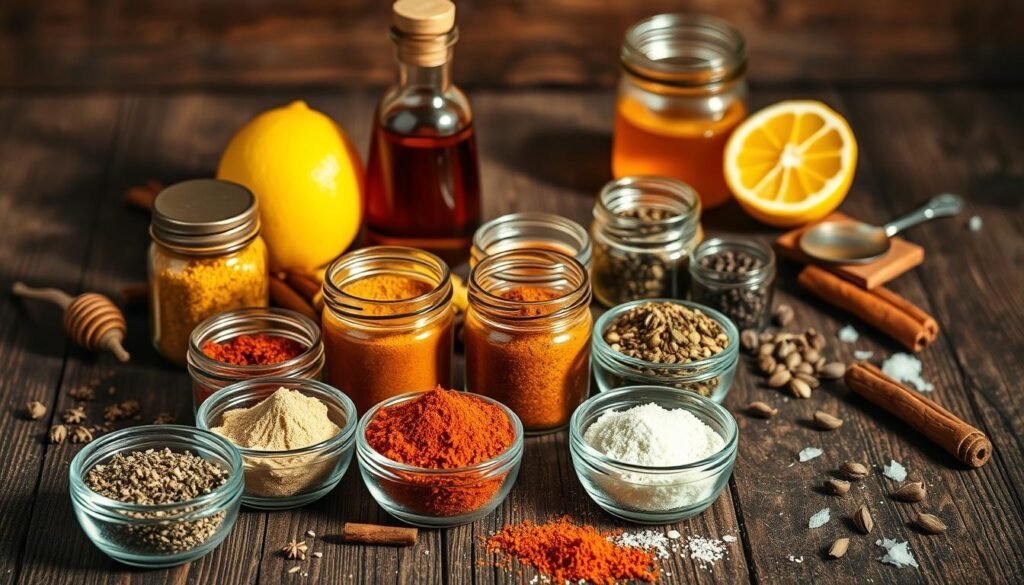
Conclusion: Making Successful Substitutions Every Time
Learning to substitute ingredients in snack recipes can really boost your cooking skills. You can make tasty treats even when you’re missing some key ingredients.
Successful substitutions need creativity and flexibility. Trying out different swaps can lead to new flavors and textures. This makes your snacks more fun and unique.
Think about what the original ingredient does in the recipe. Choose substitutes that do the same job. This careful choice helps your final snack taste just right, whether it’s flour, sugar, or milk.
Using the tips from this article will make you more confident in substituting ingredients. This skill lets you enjoy your favorite snacks, no matter what ingredients you have.
FAQ
What are some common substitutions for all-purpose flour in snack recipes?
How can I replace sugar in snack recipes?
What are some dairy-free alternatives for creamy textures in snack recipes?
Can I substitute eggs in snack recipes?
How can I accommodate nut allergies in snack recipes?
What are some alternatives to butter or oil in snack recipes?
Can I substitute chocolate chips with other ingredients in snack recipes?
How can I adjust snack recipes when using flour substitutes?

With a passion for making good food easy, Ryan focuses on tips, tricks, and approachable advice for anyone who wants to eat well without spending hours in the kitchen. Whether you’re prepping lunchboxes, feeding a busy family, or just need something tasty in a pinch, Ryan’s here to help you keep it quick and simple—one bite at a time.
Subscribe to Our Newsletter

